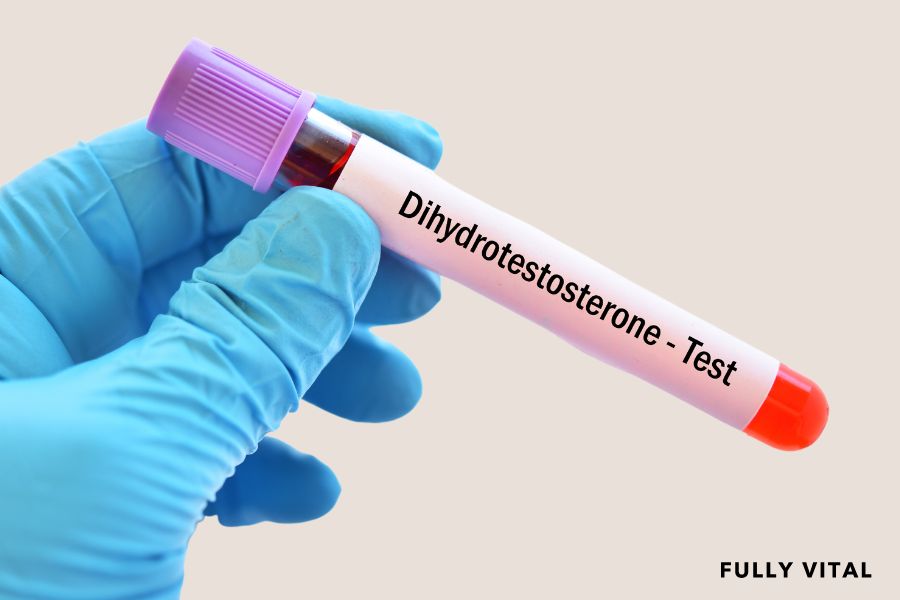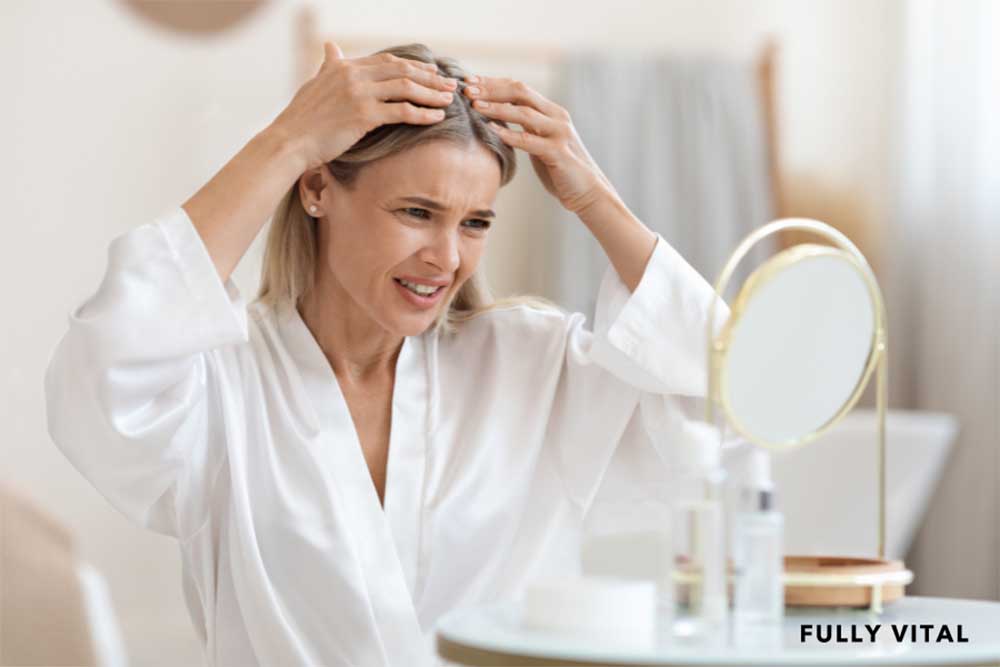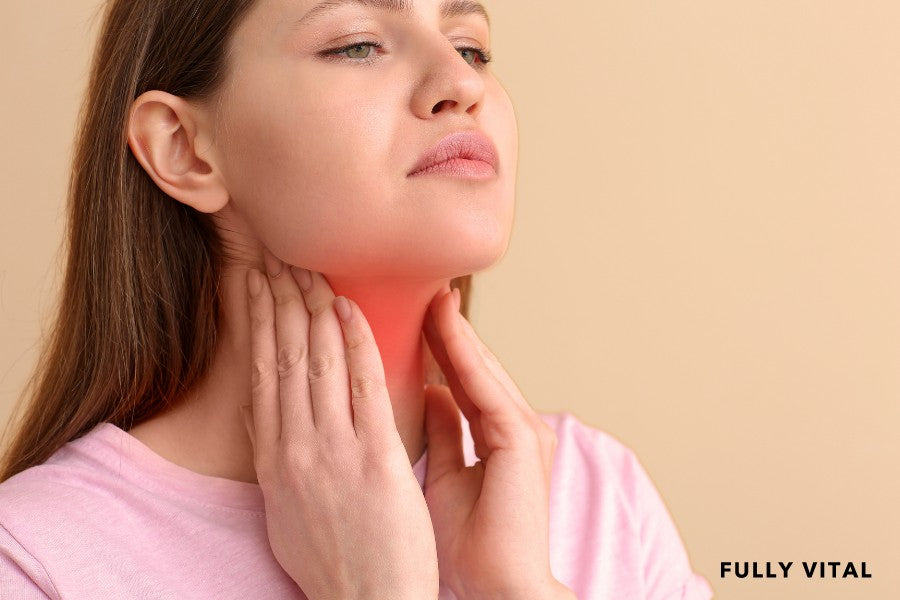
Dihydrotestosterone: Unveiling the Key Player in Hair Growth and Loss
Welcome to our hair growth product company's dedicated page, where we unravel the mysteries of dihydrotestosterone (DHT) – a pivotal factor in the journey of hair growth.
As women with diverse hair types seek effective ways to stimulate hair growth, understanding the role of DHT becomes essential.
In this conversational guide, we'll break doxwn the science behind DHT, its significance, workings, benefits, potential downsides, and alternative options.

I LOVE MY HAIR NOW
FullyVital hair serum and hair vitamins made tremendous improvements in my hair. I truly love my hair now.
Dorit S.,
What Is Dihydrotestosterone (DHT)?
DHT, short for dihydrotestosterone, is a potent androgen hormone derived from testosterone.
Found in both men and women, DHT plays a crucial role in the development of primary and secondary sexual characteristics.
While it contributes to the growth of body hair, it can also impact hair growth on the scalp.1

Why Is Dihydrotestosterone Important For Hair Growth?
DHT exerts a significant influence on the hair growth cycle. It plays a role in the development of hair follicles, affecting their size and activity.
However, excessive levels of DHT can lead to hair thinning and miniaturization of hair follicles, ultimately contributing to hair loss.
How Does Dihydrotestosterone Work?
DHT binds to androgen receptors in hair follicles, causing them to shrink over time.
This process, known as follicle miniaturization, shortens the growth phase of the hair and prolongs the resting phase.
As a result, affected hair becomes thinner and more delicate, leading to hair loss.
What Are The Benefits Of Dihydrotestosterone?
In healthy levels, DHT is vital for the development of facial and body hair.
It's also essential during puberty for the growth of pubic hair and the deepening of the voice.
However, maintaining a balance is crucial to prevent its negative impact on scalp hair.
Are There Any Downsides To Dihydrotestosterone?
Excessive DHT levels have been linked to hair loss conditions like androgenetic alopecia (pattern hair loss).
While it's a natural part of the hair growth process, genetic predisposition and hormonal fluctuations can lead to higher levels of DHT, accelerating hair loss in both men and women.
Exploring Alternatives To Dihydrotestosterone
For those concerned about DHT-related hair loss, several alternatives are available.
Some opt for medications that inhibit the conversion of testosterone to DHT.
Additionally, natural remedies and lifestyle adjustments can contribute to overall hair health and minimize the impact of excess DHT.
What Increases DHT In The Scalp?
As we dive deeper into the realm of dihydrotestosterone (DHT) and its role in hair growth, understanding what factors can lead to increased DHT levels in the scalp becomes essential.
Let's explore the key culprits behind heightened DHT and its potential impact on hair health.
Factors Contributing to Increased DHT in the Scalp
-
Genetic Predisposition: Family history can play a significant role in determining your susceptibility to higher DHT levels in the scalp.2
-
Hormonal Fluctuations: Changes in hormonal balance, such as those occurring during puberty, pregnancy, or menopause, can trigger an uptick in DHT.
-
Dietary Habits: A diet high in unhealthy fats and sugars can potentially stimulate excess DHT production.
-
Stress: Chronic stress can disrupt hormone regulation, potentially leading to elevated DHT levels.
-
Inflammation: Scalp inflammation caused by various factors can contribute to increased DHT production.
-
Lifestyle Choices: Smoking and excessive alcohol consumption can impact hormone levels and lead to higher DHT.
Does Dihydrotestosterone Increase Hair Growth?
DHT's impact on hair growth is a complex puzzle.
While it's a natural component of the hair growth process, its influence isn't always positive.
Let's explore the intricacies of how DHT can affect hair growth.
The DHT-Hair Growth Relationship
-
Promotion of Terminal Hair: In certain areas of the body, DHT contributes to the growth of terminal hair, such as facial and body hair.
-
Mixed Signals: DHT's role in scalp hair growth is less straightforward. While it's involved in the development of hair follicles, excessive levels can lead to follicle miniaturization and eventual hair loss.
What Kills DHT on the Scalp?
Managing DHT levels on the scalp is a common concern for those striving for healthy hair.
Let's explore tactics to counteract the effects of excess DHT.
DHT Management Techniques
-
Topical DHT Blockers: Ingredients like saw palmetto and ketoconazole are believed to inhibit DHT production when applied to the scalp.
-
Nutritional Supplements: Certain supplements, such as zinc and biotin, may support a balanced hormonal environment.
-
Healthy Lifestyle: Regular exercise and a balanced diet rich in nutrients can contribute to hormone regulation.
-
Scalp Care: Keeping the scalp clean and well-nourished can help maintain a healthy hair environment.
Our Best Sellers
How Do I Stop DHT from Causing Hair Loss?
Fear not, for there are steps you can take to address DHT-related hair loss and promote hair health.
Strategies to Counter DHT-Induced Hair Loss
-
Medical Interventions: Consult a healthcare professional for prescription medications that inhibit DHT conversion, such as finasteride.
-
Natural Remedies: Explore natural DHT-blocking ingredients like pumpkin seed oil or green tea extract.
-
Healthy Hair Routine: Implement a holistic hair care routine that includes gentle cleansing, conditioning, and scalp massages.
Busting Myth: Does Washing Hair Reduce DHT?
The notion that washing hair can significantly reduce DHT levels is a common misconception.
Let's clarify the relationship between hair washing and DHT.
The Truth About Hair Washing and DHT
-
Limited Impact: Hair washing might temporarily remove some excess DHT from the scalp surface, but it doesn't address the root cause of elevated DHT levels.
-
Comprehensive Approach: To effectively manage DHT, focus on a combination of proper scalp care, balanced nutrition, and targeted treatments.
As you navigate the realm of dihydrotestosterone and its influence on hair growth, remember that knowledge is your most potent tool.
By understanding the factors that contribute to increased DHT, the nuances of its effects on hair growth, and the strategies to manage its impact, you're equipped to make informed choices for your hair's well-being.
What Is The History Of Dihydrotestosterone?
Delving into the history of dihydrotestosterone (DHT) reveals its evolving significance in the context of hair growth.
Understanding its trajectory helps us grasp its relevance in our present and future pursuits of healthy hair.
Evolution of DHT in Hair Care
-
Discovery Phase: DHT's role in hair growth and loss was first recognized in the mid-20th century, shaping our understanding of its impact.
-
Treatment Explorations: Over the years, researchers have explored ways to manage DHT's effects, leading to the development of various interventions.
-
Scientific Advances: Advances in molecular biology have deepened our insights into DHT's mechanisms, inspiring innovative approaches to address its influence.3
What Is The Current Landscape Of Dihydrotestosterone In The Hair Care Realm?
In the current environment of hair care, dihydrotestosterone (DHT) remains a central focal point.
The interplay between science, consumer needs, and innovation shapes how we approach DHT-related concerns.
Integration of DHT Research
-
Holistic Solutions: Hair growth product companies integrate DHT-related research into comprehensive solutions that address both the root causes and visible effects of hair loss.
-
Science-Backed Ingredients: Ingredients targeting DHT modulation, informed by ongoing research, are a cornerstone of effective hair care products.
-
Personalization: DHT's impact varies from person to person. Personalized approaches cater to individual needs and levels of DHT sensitivity.

What Is The Future Of Dihydrotestosterone's In Hair Care?
As technology advances and our understanding of dihydrotestosterone (DHT) deepens, the future holds promise for innovative strategies that maximize its benefits while minimizing its potential drawbacks.
Advancements in DHT Management
-
Precision Treatments: Emerging technologies may allow for even more precise targeting of DHT pathways, enhancing treatment effectiveness.
-
Combination Therapies: Future treatments could combine DHT management with other approaches, offering multifaceted solutions.
-
Enhanced Personalization: With the integration of genetics and advanced diagnostics, personalized DHT management plans could become the norm.
Our Best Sellers
Unlock Youthful Radiance for Your Hair with Fully Vital!At Fully Vital, we're dedicated to your hair's health and vitality. Our range of science-backed hair growth products is carefully crafted to combat hair aging, allowing you to rediscover the beauty and confidence of luscious locks. Say goodbye to dull, lifeless hair and embark on a journey towards a revitalized and healthier relationship with your tresses.
Embrace the transformational power of Fully Vital's hair growth products. It's time to rewrite your hair's story and celebrate the radiance of ageless beauty. |
Final Thoughts On Dihydrotestosterone
As we wrap up our exploration of dihydrotestosterone (DHT) and its intricate role in the realm of hair growth, we've uncovered the multifaceted nature of this hormone.
From understanding its mechanisms to navigating its impact on our locks, we've embarked on a journey of discovery.
Remember, the key to nurturing your hair lies in informed choices and a holistic approach.
By grasping the factors that influence DHT levels, deciphering its effects on hair growth, and embracing strategies for balanced care, you empower yourself to embark on a journey of vibrant hair health.
At Fully Vital, we're committed to providing you with comprehensive solutions to maintain your hair's vitality and agelessness.
Our array of hair growth products is designed to halt the aging process of your hair, fostering a healthier relationship with your locks.
Explore our range of products and embark on a path towards a more vibrant and confident you.
Here's to embracing the power of knowledge and making strides towards radiant, resilient hair.
Frequently Asked Questions About Dihydrotestosterone
Can DHT blockers help prevent hair loss?
Yes, DHT blockers can be effective in slowing down hair loss by reducing the conversion of testosterone to DHT.
Is DHT found only in men?
No, DHT is present in both men and women, albeit on different levels.
Are there foods that can help regulate DHT levels?
Some foods, like those rich in antioxidants and omega-3 fatty acids, may support a healthy balance of hormones, including DHT.
Can hormonal imbalances lead to excess DHT?
Yes, hormonal fluctuations, often due to factors like stress, can contribute to higher DHT levels and subsequent hair loss.
Is DHT entirely harmful?
No, DHT has important roles in the body, including the development of certain secondary sexual characteristics.
It's excessive levels that pose a concern.
Can hormonal birth control impact DHT levels?
Yes, certain hormonal birth control methods can influence hormone levels, including DHT.
It's advisable to consult a healthcare professional when considering birth control options and their potential effects on your hair and overall health.
Can women experience pattern hair loss due to DHT?
Yes, women can experience pattern hair loss due to DHT, although it often presents differently than in men.
Women may notice diffuse thinning on the crown of the scalp.
If you're concerned about hair loss, seek guidance from a dermatologist or healthcare provider.
Does sunscreen play a role in DHT management?
While sunscreen is crucial for protecting the skin from harmful UV rays, it doesn't have a direct impact on DHT levels.
However, protecting your scalp from sunburn is important for overall scalp health.
Is there a quick fix for dht-induced hair loss?
Managing DHT-induced hair loss requires a consistent and comprehensive approach.
Be cautious of products or treatments promising quick fixes. Instead, focus on long-term strategies for maintaining a healthy scalp environment and promoting hair growth.
Should I consult a professional for DHT-related concerns?
Absolutely.
If you're experiencing significant hair loss or suspect hormonal imbalances, consulting a dermatologist or healthcare provider is advisable.
They can assess your individual situation, recommend appropriate tests, and guide you toward effective solutions.
Sources:
-
Kinter, K. J., & Anekar, A. A. (2020). Biochemistry, Dihydrotestosterone. PubMed; StatPearls Publishing. https://www.ncbi.nlm.nih.gov/books/NBK557634/
-
Urysiak-Czubatka, I., Kmieć, M. L., & Broniarczyk-Dyła, G. (2014). Assessment of the usefulness of dihydrotestosterone in the diagnostics of patients with androgenetic alopecia. Advances in Dermatology and Allergology, 4, 207–215. https://doi.org/10.5114/pdia.2014.40925
-
McDonough, P. G. (1999). Molecular biology and reproduction. The Keio Journal of Medicine, 48(1), 12–21. https://doi.org/10.2302/kjm.48.12







